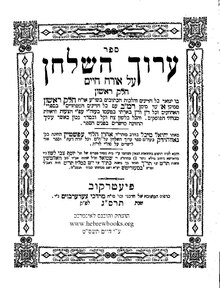Yechiel Michel Epstein
This article needs additional citations for verification. (July 2018) |
Rabbi Yechiel Michel Epstein | |
|---|---|
Navahrudak |
Yechiel Michel ha-Levi Epstein (Hebrew: יחיאל מיכל הלוי אפשטיין)
(24 January 1829 – 25 March 1908), often called "the Aruch haShulchan" after his magnum opus,
Biography
Rabbi Yechiel Michel Epstein was born on 24 January 1829 in Babruysk, Russian Empire (presently in Belarus) to Aharon Yitzchak and Rashka Epstein. His father Aharon Yitzchak Epstein was a builder and contractor who spend much of his time traveling for his work, which were often projects of the
He had one brother, Benjamin Beinush Epstein, who lived in Saint Petersburg. The two brothers stayed in touch over the years, and when Epstein needed to travel to Saint Petersburg—usually to submit his writings to the Russian censor before publishing—he would stay at his brother's house. [2]
As a child, Epstein studied in a traditional
In Volozhin, he met and started a lifelong friendship with Rabbi Naftali Zvi Yehuda Berlin (the Netziv), who later became the rosh yeshiva (head) of the Volozhin Yeshiva. After finishing his studies there, Epstein married Berlin's sister Michlah. (Epstein later became Berlin's father-in-law, when Berlin remarried to Epstein's daughter Batya Miriam after the death of his first wife.)
After his marriage, Epstein returned to Babruysk, and he taught in the Altshul yeshiva there.[4]
He received
By 1862, Epstein was serving as a
In 1864, at the age of 35, Epstein was appointed rabbi of
In 1874, after ten years as rabbi in Novozybkov, Epstein was appointed as the rabbi of
Epstein was involved in many charitable endeavors. He was particularly close to Rabbi Shmuel Salant, the chief rabbi of Jerusalem, and wrote extensively on the obligation of all Jews to support the Rabbi Meir Baal Haneis charity that Rabbi Salant founded in Israel in 1860.
Epstein died on 22
Children
The Epsteins had 5 children:
- Eidel Kahanov, his first born, married a wealth merchant from Odessa.
- Rabbi Dov Ber Epstein, the eldest son, moved to Jerusalem in 1902, where he served in a number of public positions.
- Brina Walbrinska took over publishing her father's works after his death. She was also on the executive board of the Navahrudak orphanage.
- Batya Miriam Berlin divorced her first husband, a young man from a wealthy family, several months after the wedding, as he was unwilling to fulfill his promise to dedicate himself to Torah study. When Rabbi Naftali Zvi Yehuda Berlin's first wife died several years later, she happily agreed to marry him, even though the rosh yeshiva was 30 years her senior.[10] Among their children was Rabbi Meir Bar-Ilan.
- Rabbi Baruch Epstein was a bookkeeper by profession but produced a number of scholarly and popular works, most notably the Torah Temimah.
Works

- Aruch HaShulchan - his magnum opus, a code of Halakha tracing the origins of each law and custom, clarifying the opinions of the Rishonim and arriving at a psak (decision) - often supported by (and sometimes in disagreement with) the Acharonim. Regarded by some as the most comprehensive, seminal, and original modern restatement of Jewish law since Rambam. [11][page needed]
- Aruch HaShulchan he'Atid (Laying the Table of the Future) - a parallel work to Arukh HaShulkhan, summarising and analysing the laws that will apply in Messianic times. This work became more relevant when Jewish farming communities were re-established in Israel, since many agricultural laws which apply only in Israel are covered in this work.
- Ohr la-Yesharim - his first work, a commentary on the classic work Sefer ha-Yashar by the Tosafist Rabbeinu Tam.
- Meichal ha-Mayim - a commentary on the Jerusalem Talmud.
- Leil Shimurim - a commentary on the Haggadah for Passover.
- Derashot Kol Ben Levi - a collection of sermons he delivered in the main synagogue of Navahrudak, often including long Halakhic sections.
Prominent rabbis he ordained
As a well-known authority of
- Ashkenazi Chief Rabbi of British Mandatory Palestine.
- Rabbi Isser Zalman Meltzer, the rabbi of Slutsk and rosh yeshiva of the Etz Chaim Yeshiva in Jerusalem.
- Rabbi Yosef Eliyahu Henkin, prominent Orthodox rabbi and posek.
- Rabbi Yehezkel Abramsky, head of the London Beth Din rabbinical court and later rosh yeshiva of Slabodka yeshiva in Bnei Brak.
- Rabbi Shlomo Yosef Zevin, the founder and chief editor of the Encyclopedia Talmudit.
- Rabbi Yosef Shlomo Kahaneman, Orthodox rabbi and rosh yeshiva of the Ponevezh Yeshiva.
- Religious Zionist movement. He was Israel's first Minister of Religions.
Notes
- ^ Henkin 2018, pp. 37–38.
- ^ Henkin 2018, p. 38.
- ^ Epstein, Baruch (1928). Makor Baruch. p. 1195.
- ^ Bar-Ilan, Meir (1939). From Volozhin to Jerusalem. p. 276.
- ^ Henkin 2018, pp. 47–49.
- ^ Henkin 2018, p. 46.
- ^ Henkin 2018, pp. 55–58, 321–348.
- ^ Henkin 2018, p. 61.
- ^ Henkin 2018, p. 224.
- ^ Henkin 2018, pp. 213–216.
- ^ Broyde & Pill 2021.
- ^ Henkin 2018, pp. 365–370.
References
- Henkin, Eitam (2018). Set a Table Before Me. Jerusalem: Maggid Books. ISBN 978-965-526-260-5.
- Shapiro, Chaim (1988). Rabbi Nisson Wolpin (ed.). The Torah Profile: A Treasury of Biographical Sketches. Brooklyn, New York: Mesorah Publications. ISBN 0-89906-860-X.
- Broyde, Michael; Pill, Shlomo (2021). Setting the Table: An Introduction to the Jurisprudence of Rabbi Yechiel Mikhel Epstein's Arukh HaShulhan. Academic Studies Press. ISBN 978-164-469-070-3.
External links
- Biography of Rabbi Yechiel Mechel Epstein
- Aruch HaShulchan at Hebrew Wikitext (Hebrew text)
- Aruch HaShulchan Orach Chaim (incomplete English translation)
- A Collection of Studies on the Aruch HaShulchan, its author, and the history of its publication
- Aruch HaShulchan Yomi - Daily study cycle at AishDas
- Classes on Aruch HaShulchan Archived 2005-09-04 at the Wayback Machine
- HebrewBooks has most of the Aruch HaShulchan scanned in pdf format (search for ערוך השלחן)
